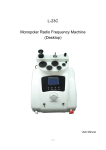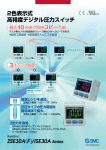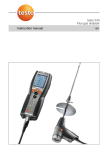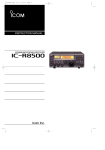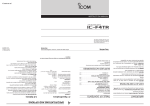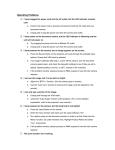Download ICOM - AH-4 User manual
Transcript
INSTRUCTIONS HF + 50 MHz AUTOMATIC ANTENNA TUNER AH-4 Thank you for purchasing the AH-4 AUTOMATIC ANTENNA TUNER. The AH-4 matches your transceiver to an antenna more than 7 m/23 ft long (3.5 MHz and above). Please read these instructions thoroughly before installing and operating the AH-4. DANGERµ RNEVER use this tuner when it is ungrounded. Always ground the tuner through the ground terminal before operating. DO NOT use the mounting plates for grounding. Ground terminal NEVER transmit or tune without an antenna. Failure to use an antenna will damage the tuner. Mounting plate RHIGH VOLTAGE! NEVER touch the antenna while transmitting or tuning. Place the antenna in a position where you are sure it will not be touched. FEATURES ❍ WIDE TUNING RANGE The AH-4 provides reliable matching of frequencies from 3.5 MHz to 54 MHz when using at least a 7 m (23 ft) antenna; or 7 MHz to 54 MHz when using the AH-2b ANTENNA ELEMENT. ❍ AUTOMATIC DIGITAL CONTROL TUNING The built-in 8-bit microprocessor chooses the lowest SWR condition from more than 1,040,000 different LC (coil/capacitor) combinations. ❍ 45 FREQUENCY MEMORIES FOR FAST TUNING The LC combinations of 45 previously-used frequencies are automatically memorized in the AH-4. Once a frequency is memorized, the AH-4 tunes on that frequency in less than 1 sec. Note that the AH-4 does not memorize a frequency which is normally tuned within 2.5 sec. Memories are retained only when the power is on. ❍ WEATHERPROOF DESIGN The AH-4’s tightly sealed plastic case allows convenient mounting virtually anywhere. The AH-4 can be mounted outdoors under your antenna. ❍ 0.3 W RADIATED POWER Radiated power during tuning is less than 0.3 W, minimizing interference to other stations. ✍ NOTE: 50 MHz tuning is possible with the IC-729*, IC-706MKII, IC-746 and IC-756; the IC-706 and IC736 can only be tuned 3.5–30 MHz. * Connect a 50 MHz antenna connector for 50 MHz operation. Provided by http://www.yaesu-museum.com Downloaded by Amateur Radio Directory SUPPLIED ACCESSORIES u q w i e r t y o !0 q U-bolts .................................................................. 2 w U-bolt plates ......................................................... 2 e Flat washers (M6 large) ........................................ 8 r Flat washers (M6 small) ....................................... 4 t Spring washers (M6) ............................................ 8 y Nuts (M6) .............................................................. 8 u Hex head bolts (M6 × 50) ..................................... 4 i Self-tapping screws (A0 6 × 30) ........................... 4 o PL-259 connectors ............................................... 2 !0 Weatherproof cap ................................................. 1 !1 Control cable (OPC-136; 5 m)............................... 1 !2 Coaxial cable (5D-2V × 5 m) ................................. 1 INSTALLATION ✍ NOTE: After inserting the coaxial cable into the AH4 top cover, solder the PL-259 connector to the coaxial cable. ➀ Remove the top cover (Fig. 1). ➁ Install the control cable and coaxial cable (Fig. 1). ➂ Connect and solder the PL-259 connector to the coaxial cable (Fig. 4). ➃ Connect the control cable to the AH-4 (Fig. 2). ➄ Connect the GND cable to the AH-4 (Fig. 3). ➅ Replace the top cover. ➆ Mount the AH-4 in the desired location; on an antenna pole, in your vehicle’s trunk, etc. (Fig. 5). ➇ Connect an antenna to the AH-4 (Fig. 6). ➈ Connect the control cable and the coaxial cable to the transceiver. Fig. 1 COVER REMOVAL AND CABLE INSTALLATION ➀ Remove 8 screws from the top cover and remove the cover. ➁ Loosen the screws on both cable clamps. If desired, install a strain relief insert (supplied) corresponding to the diameter of the cable. ➂ Install the coaxial cable through the top cover cable clamp. ➃ Install the control cable through the bottom cover cable clamp. ➄ After connecting the coaxial cable and control cables, tighten the cable clamp screws. Strain relief insert Coaxial cable Control cable Cable clamp Fig. 2 CABLE CONNECTIONS (ex. IC-706MKII) Antenna element AH-2b (optional) Coaxial cable IC-706MKII rear panel black (GND) red (DC13V) white (START) green (KEY) PL-259 connector J2 J8 GND Top cover ✍ NOTE: For the IC-756 and IC-746, connect to ANT 1. GND Bottom cover Control cable Fig. 3 GROUND CONNECTIONS The transceiver and antenna tuner must have an adequate ground connection. Otherwise, the overall effency of the transceiver and antenna tuner installation will be reduced. Interference, RF feed back and electrical shocks from other equipment could also occur. For best results, use the heaviest gauge wire or strap available and make the connection as short as possible. (see right) • A long wire connected to the GND terminal as a counterpoise is also acceptable. • Ground example To AH-4 GND terminal Copper pipe Metal object yyyyyy ;;;;;; ;;;;;; yyyyyy ;;;;;; yyyyyy ;;;;;; yyyyyy Copper screen Fig. 4 PL-259 CONNECTOR SOLDERING 30 mm ➀ Slide the coupling ring over the coaxial cable. Strip ➀ Coupling ring the cable jacket and pull it down to reveal 10 mm (0.4 in) of braid. 10 mm (soft solder) 10 mm ➁ • Soft solder the exposed braid and then pull the jacket back in place. Soft solder ➁ Strip the cable as shown at left. Tin the center con- 1–2 mm ductor the entire length of the exposed braid. ➂ Slide the connector body over the cable and sol- solder solder ➂ der as shown at left. ➃ Screw the coupling ring onto to the connector body. ➃ (10 mm ≈ 3⁄8 in) Fig. 5 MOUNTING THE AH-4 • Mounting on an antenna pole • Mounting on a flat location Using self-tapping screws Using nuts and bolts Using the supplied U-bolts Nut Spring washer AH-4 Flat washer Hex head bolt Weatherproof cap Drill a hole here (diameter: 6.6–7 mm) Fig. 6 MOUNTING EXAMPLES AH-2b ANTENNA ELEMENT KIT (optional) AH-2b + long wire OPERATION To ensure the correct impedance match, tune the antenna with the AH-4 each time the operating frequency is changed. ➀ Set the desired amateur band and frequency of the transceiver. • The [TUNER] light flashes and “CW” appears while tuning. CW USB ➁ Push and hold [TUNER] for 2 sec. ➂ The [TUNER] light lights constantly when tuning is complete. • When the connected wire cannot be tuned, the [TUNER] light goes out, the AH-4 is bypassed and the antenna wire is connected to the antenna connector on the transceiver directly. ➃ To bypass the AH-4 manually, push [TUNER]. Push [TUNER] for 2 sec. CALCULATION OF UNDESIRABLE ANTENNA LENGTHS Length of (1/2 λ) = 300 × 1 half wave operating frequency (MHz) 2 [EXAMPLE] Antenna lengths to avoid when operating at 29.00 MHz Multiple = of 1/2 λ 300 × 1 × (1, 2, 3…) = 5.2, 10.3, 15.5 m 29 2 SPECIFICATIONS • Frequency range • Maximum input power • Input impedance • Tuning power required • Rated voltage • Usable temperature range • VSWR • Weight • Dimensions : 3.5–54 MHz (with an antenna longer than 7 m; 23 ft) 7–54 MHz (with the AH-2b) : 120 W : 50 Ω : 10 W (5–15 W) : 13.8 V DC ±15% (current drain less than 1 A) : –10°C to +60°C (+14°F to +140°F) : 2.0 : 1 or less (except antennas a half wave or multiple of a half wave in length) : 1.2 kg (2.65 lb) : 172(W) × 69.5(H) × 230(D) mm; 625⁄32(W) × 63⁄4(H) × 91⁄16(D) in All specifications are subject to change without notice or obligation. OPTIONS • OPC-420 SHIELDED CONTROL CABLE (cable length 10 m) Shielded control cable helps protect the transceiver from RF feedback and extends separation between tuner and transceiver up to 10 m. • AH-2b ANTENNA ELEMENT A 2.5 m long antenna element for mobile operation with AH-4. Frequency coverage: 7–54 MHz with the AH-4. The AH-4 complies with essential requirements of the 89/336/EEC directive for Electromagnetic Compatibility. This compliance is based on conformity with the ETSI specification ETS300 684 (EMC product standard for Commercially Available Amateur Radio Equipment). Provided by http://www.yaesu-museum.com Downloaded by Amateur Radio Directory Count on us! 6-9-16 Kamihigashi, Hirano-ku, Osaka 547-0002 Japan A-8295G-1EX Printed in Japan Copyright 1997 by Icom Inc.




